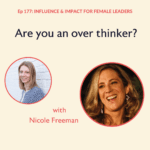Some of my most popular episodes have been on overthinking and worry and I know from personal experience how much it can hold you back and impact your self-esteem. So I jumped at the chance to interview Nicole Freeman, who coaches many senior professionals around overthinking.
In this episode you’ll hear more about…
-
How overthinking is linked to avoiding our feelings
-
The 3 key fears that come up for many of us
-
The signs that you may be overthinking
-
Practical steps you can take to deal with overthinking and build more positive thought patterns
My name’s Carla Miller, leadership coach, author and trainer. And this is the Influence & Impact podcast for women leaders, helping you confidently navigate the ups and downs of leadership and feel less alone on your journey as a leader. In fortnightly episodes I share practical tools and insights from myself and my brilliant guests that will help you succeed in your career.
You might also enjoy episode 110 ‘How to stop overthinking’ and episodes 122 and 123 on worrying.
FREE RESOURCE – How To Say No Challenge:
If you struggle to say ‘no’ then this free 5 day challenge is for you. You’ll receive a short email each day containing a short video taking you through the 5 steps of my How To Say No framework. We’ll get you happily saying no in just 5 days!
Join the next cohort of Influence & Impact to learn how to tackle self-doubt, increase your impact and become brilliant at influencing. It’s a small cohort working closely with me and includes 6 workshops and 2 peer coaching sessions.
My Be Bolder 4 week confidence and assertiveness course will be running again in February. In it we cover:
⭐ Tackling imposter feelings and self-doubt
⭐ Mastering your mindset
⭐ Courageous conversations
⭐ Speaking up
More about Nicole Freeman:
Nicole is a highly regarded ICF accredited coach working with mid- and senior-level professionals. With chartered accountancy and MBA qualifications as well as experience as an interim FD, business consultant, owner of her own multi award winning business and having run a small family business, she’s commercially focused with strong business acumen, and comfortable across a range of industries. Her background as a top performing audit and transaction senior manager, and then project manager to the UK leadership team in one of the Big 4 accountancy firms, means she’s well placed to understand the challenges those in professional services face.
Her areas of expertise are around perfectionism, people pleasing and
procrastination, things common for high achievers. As a trusted confidante, sounding board and thinking partner, Nicole is a natural asset to individuals and organisations keen to unlock their full potential through coaching.
Nicole’s website: www.nicolefreeman.co.uk
Find Nicole on LinkedIn
Nicole offers a free Mindset MOT you can book at
